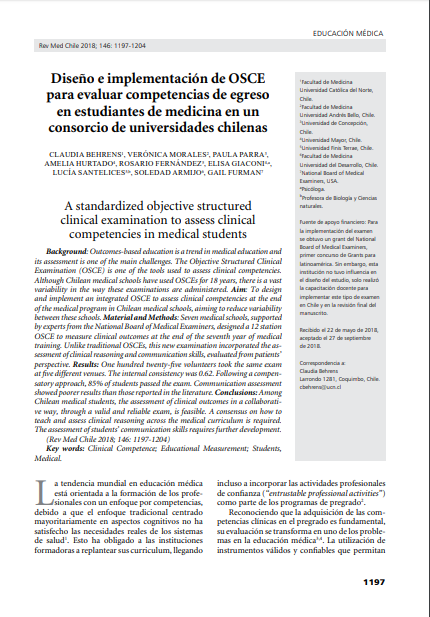A standardized objective structured clinical examination to assess clinical competencies in medical students

Fecha
2018Autor
Hurtado, Amelia [Univ Mayor, Santiago, Chile]
Giaconi, Elisa [Univ Mayor, Santiago, Chile]
Behrens, Claudia
Morales, Veronica
Parra, Paula
Fernández, Rosario
Ubicación geográfica
Notas
HERRAMIENTAS
Acceda a títulos restringidos
¿Cómo descargar?Resumen
Background: Outcomes-based education is a trend in medical education and its assessment is one of the main challenges. The Objective Structured Clinical Examination (OSCE) is one of the tools used to assess clinical competencies. Although Chilean medical schools have used OSCEs for 18 years, there is a vast variability in the way these examinations are administered. Aim: To design and implement an integrated OSCE to assess clinical competencies at the end of the medical program in Chilean medical schools, aiming to reduce variability between these schools. Material and Methods: Seven medical schools, supported by experts from the National Board of Medical Examiners, designed a 12 station OSCE to measure clinical outcomes at the end of the seventh year of medical training. Unlike traditional OSCEs, this new examination incorporated the assessment of clinical reasoning and communication skills, evaluated from patients' perspective. Results: One hundred twenty-five volunteers took the same exam at five different venues. The internal consistency was 0.62. Following a compensatory approach, 85% of students passed the exam. Communication assessment showed poorer results than those reported in the literature. Conclusions: Among Chilean medical students, the assessment of clinical outcomes in a collaborative way, through a valid and reliable exam, is feasible. A consensus on how to teach and assess clinical reasoning across the medical curriculum is required. The assessment of students' communication skills requires further development.
URI
http://dx.doi.org/10.4067/S0034-98872018001001197http://repositorio.umayor.cl/xmlui/handle/sibum/6252
Coleccion/es a la/s que pertenece:
Si usted es autor(a) de este documento y NO desea que su publicación tenga acceso público en este repositorio, por favor complete el formulario aquí.